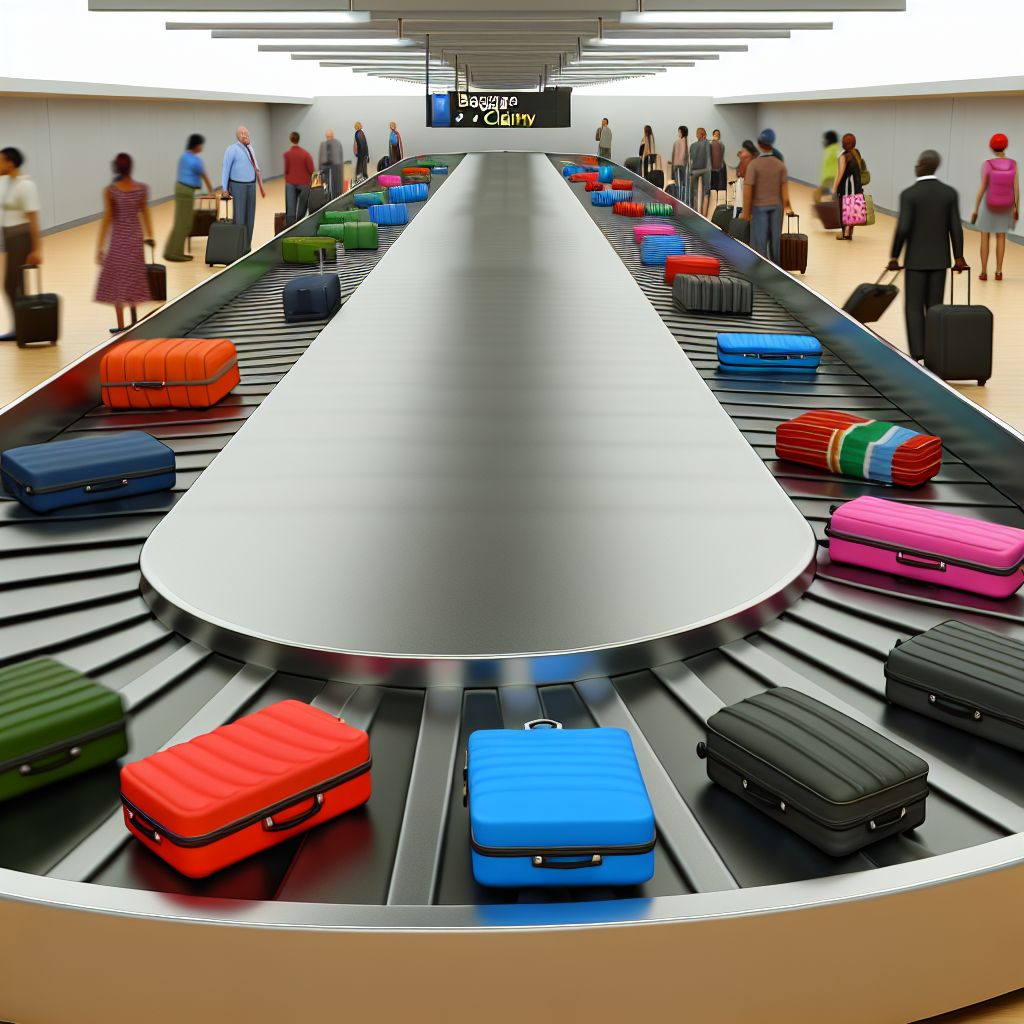Baggage Claim is area at the airport terminal where passengers pick up their checked-in luggage after arrival to the destination.
Usually consists of a moving conveyor on which the bags are placed by airport staff.
Baggage claim in the travel context refers to the area within an airport where passengers retrieve their checked luggage after arriving at their destination. This area is typically located in the arrivals section of the airport, beyond the security checkpoint and customs for international flights. Conveyor belts or carousels are commonly used to deliver bags to passengers, displaying flight numbers and origin cities to help passengers identify the correct luggage retrieval point.
Description

The baggage claim process is a crucial part of air travel, marking the final step in a passenger's airport experience before exiting to the public areas of the terminal or transferring to another flight. Efficiency and accuracy in baggage handling and delivery are essential to ensure a positive travel experience and minimize inconvenience or delays for travelers. Airports and airlines have systems in place to track and manage luggage, aiming to reduce instances of lost or delayed baggage.
Modern airports may employ advanced technology, such as RFID tags and mobile app notifications, to improve the accuracy and speed of baggage handling and to keep passengers informed about the status of their luggage. Despite these advancements, challenges such as misplaced or delayed luggage still occur, prompting airlines to offer compensation or assistance to affected passengers.
Application Areas
Baggage claim areas are a fundamental component of all commercial airports, serving both domestic and international passengers. The design and operation of these areas can vary, with some airports offering additional services such as:
- Luggage Wrapping: Services to protect checked baggage with a layer of plastic film.
- Porter Services: Assistance for passengers needing help with their luggage.
- Lost and Found: Offices to assist passengers with lost or misplaced items during their travel.
- Baggage Delivery Services: Offering the option for passengers to have their luggage delivered directly to their home, hotel, or final destination.
Well-Known Examples
While baggage claim areas are generally standard across airports, some notable airports are recognized for their efficient, innovative, or user-friendly baggage claim experiences, such as:
- Singapore Changi Airport: Known for its efficiency and the use of advanced technology in baggage handling.
- Munich Airport: Offers an impressive level of service and efficiency in luggage handling, reflecting the overall high standards of the airport.
- Dubai International Airport: Handles a vast volume of international passengers and baggage, incorporating technology to streamline the baggage claim process.
Treatment and Risks
The baggage claim process is typically straightforward, but passengers may sometimes face issues such as delayed, damaged, or lost baggage. Airlines and airports have policies and procedures in place to address these concerns, including tracking systems to locate misplaced luggage and compensation protocols for affected passengers. Travelers are advised to clearly label their luggage and, when possible, carry essentials in their carry-on to mitigate the impact of any delays in receiving checked baggage.
Similar Terms or Synonyms
- Luggage Reclaim
- Luggage Collection
Summary
Baggage claim is an essential part of the airport infrastructure, enabling passengers to collect their checked luggage upon arrival. While the process is usually efficient, improvements and innovations continue to be made to enhance the passenger experience. As a critical touchpoint in the journey, the effectiveness of the baggage claim area significantly affects the overall satisfaction with air travel.
--
Related Articles to the term 'Baggage Claim' | |
| 'Gate' | ■■■■■■■■■ |
| Gate is the where passengers board a plane. . . . Read More | |
| 'Baggage Allowance' | ■■■■■■ |
| Baggage Allowance is the set of rules regarding Customer luggage and established by the airline, such . . . Read More | |
| 'Boarding' | ■■■■■■ |
| "Boarding" refers to the act of getting on and off a mode of Transportation, such as a plane, train, . . . Read More | |
| 'Arrival' | ■■■■■■ |
| "Arrival" refers to the act of reaching a destination or the point at which travelers reach their intended . . . Read More | |
| 'Belt' | ■■■■■ |
| Belt in the travel context typically refers to the luggage conveyor belt system found in airports. This . . . Read More | |
| 'Disembarkation' | ■■■■■ |
| In the travel context, disembarkation refers to the process of leaving a Vehicle or vessel, such as a . . . Read More | |
| 'Belting leather' | ■■■■■ |
| . . . Read More | |
| 'Check-In' | ■■■■■ |
| Check-In is the procedures for a Hotel Guest's arrival and registration. . . . Read More | |
| 'Carry-on approved' | ■■■■ |
| Carry-on approved will meet most airline Requirements for luggage allowed onto an airplane small enough . . . Read More | |
| 'Overnight bag' | ■■■■ |
| Overnight bag is the Luggage large enough to carry clothing and personal items for an overnight stay. . . . Read More | |
